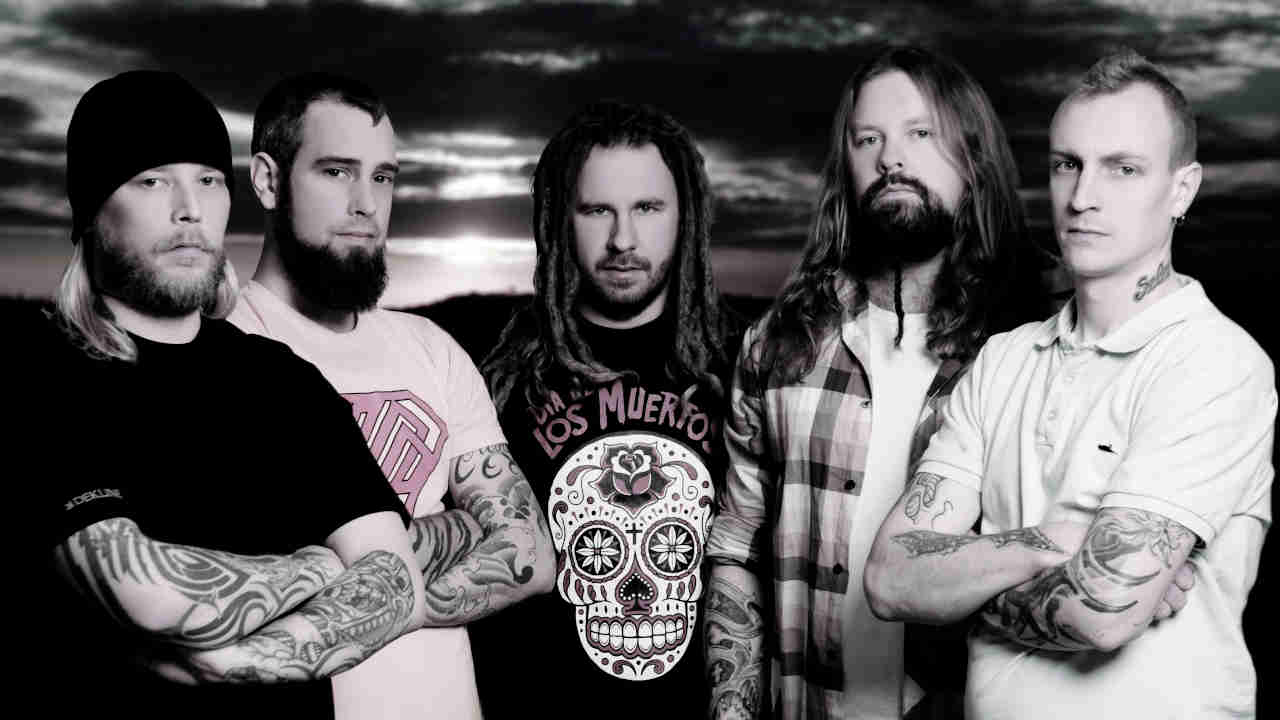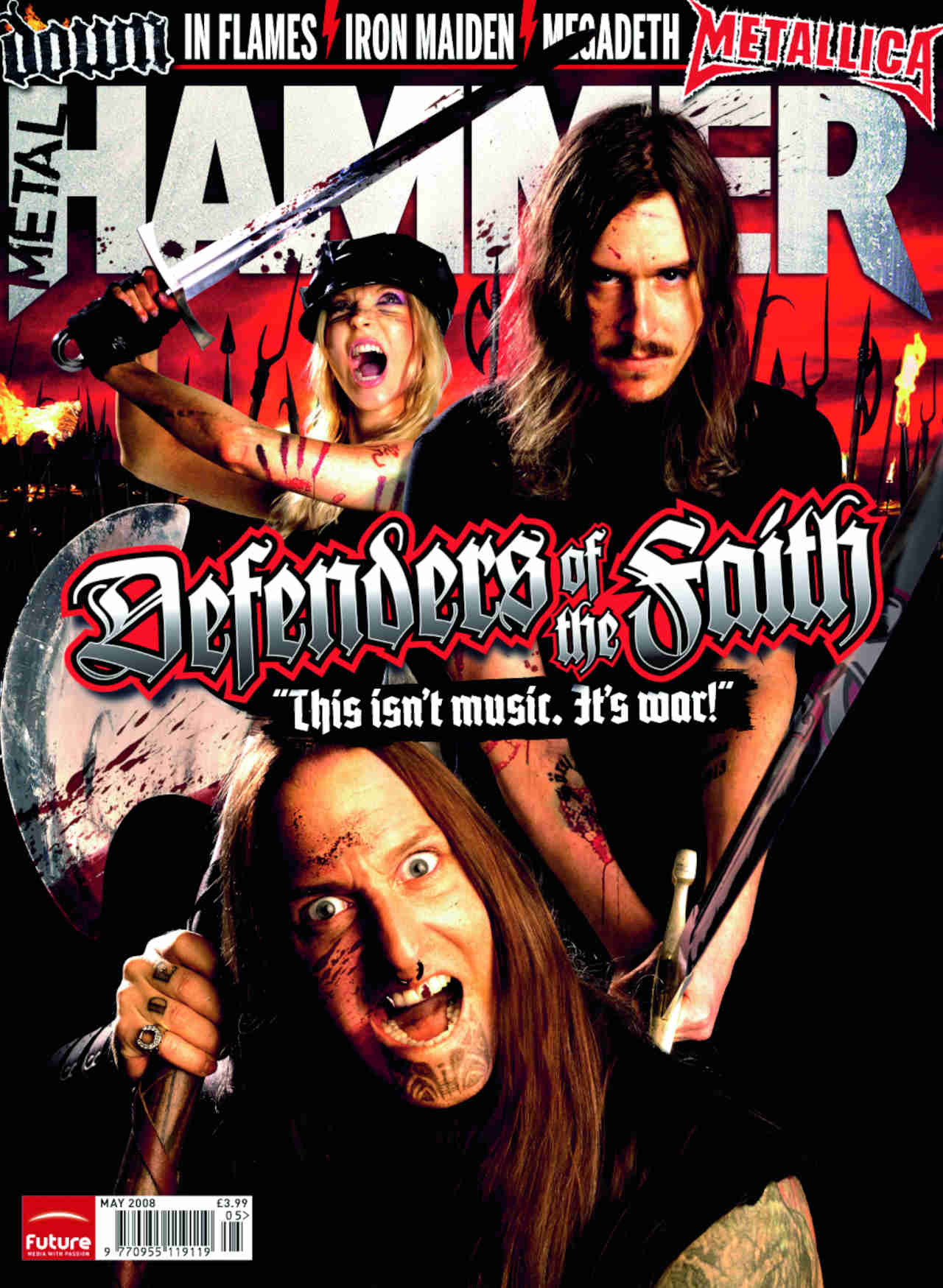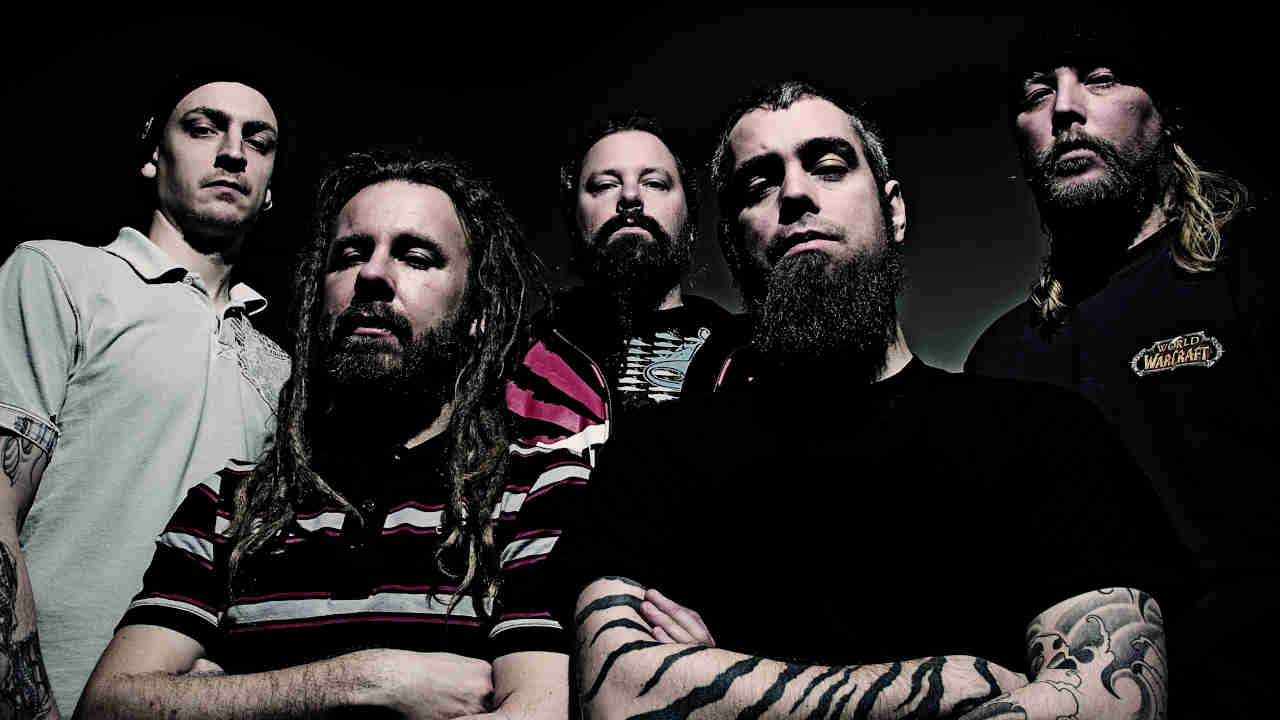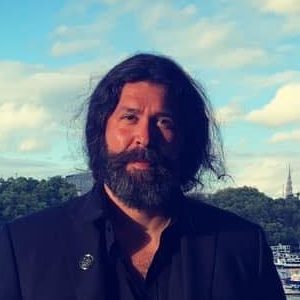In Flames have been mainstays of the Swedish metal scene for more than 30 years. In 2008, as they released their ninth album, A Sense Of Purpose, frontman Anders Fridén mused on haters, derivative bands and whether or not coke belongs in whiskey.
It isn’t easy to annoy Anders Fridén. It’s about more than the glacial reserve that’s so common to denizens of their homeland, Sweden. And it isn’t just to do with the fact that he’s done approximately five billion interviews over the course of his 13-year tenure as In Flames’ unswervingly soft-spoken frontman. It’s that Anders Fridén is unerring in his resolve to bottle every anxiety, frustration, and modicum of anger he can summon for his lyrics and his singular ability to explosively deliver them on cue. That’s except for the times when, as Hammer discovers, it’s politely suggested to him that the only decision that needs to be made about whiskey is whether you pour the Coke in first or afterward.
“Oh my fucking God, no… it’s just… no!” He cracks a smile. “You’re uh… joking, right?”
Kinda. Right now he’s sitting across from founding guitarist Björn Gelotte in the heart of a Soho studio relating the biography of A Sense Of Purpose, In Flames’ ninth studio album and – if you know anything about their remarkably diverse discography – one of their most accessible and definitive albums to date. Just how this modest band from Gothenburg became synonymous with the melodic death metal movement and key to the fabled ‘Gothenburg sound’ over the course of their 18-year career is a difficult knot to unravel, especially when you consider it’s taken them from their suburban origins to selling nearly 400,000 copies of Come Clarity. As stories go, Anders’ love of fine whiskey is just as good a thread as any.
“It’s not a pretentious thing,” he says, sounding very convinced. “I can eat McDonald’s or drink a lager but if I have a choice I want something that’s good. I used to go to a pub every day after work and I’d just talk with friends. At first it was like ‘Yuck’, but then I started getting really interested in the whole process behind it, and I became a collector a few years later. It isn’t just the way it tastes. When you drink something that’s been lying there silent for 40 years and you think about everything that’s happened in the world during that time… that’s something very special.”
Asked what he would think of were he to sit back to a glass of the smoky elixir that was bottled in 1995, the year he joined In Flames after his brief tenure in fellow Gothenburg metallers Dark Tranquillity, he sits up and says, “Jesus, let me think about that.” He looks to Björn for an answer and, finding none, continues. “Well, it wouldn’t be me joining. The first chapter would have to be me wanting to quit a year into it. I mean, we were struggling. I was working to pay rent, we all were, and we were missing tours, and I was asking myself if I should get an education. I decided to give it another year. And that’s when [1996’s] The Jester Race happened and everything changed for us. It was the moment everything turned around for us. It’s still turning around.”

If you’re familiar with In Flames’ relationship with their fans, then you’ll know that it hasn’t been an easy one. Forever persecuted for their gradual evolution from an underground metal band to a mainstream proposition…
“Hang on, wait a minute,” says Anders. “I’ve had to defend myself from day one. When we did The Jester Race I had to defend myself for it not being more extreme, and then again and again and again. But we’ve done nine albums now. It’s an unimaginable figure.”

That’s no understatement, but if there’s a difference to …Purpose it’s that, for the first time, the quintet recorded as a band over two months in late 2007. It sounds trivial, but in an age where broadband has effectively jettisoned the need for recording bands to ever occupy the same room, it’s been easy for In Flames to become estranged from each other. For example, Anders now lives in Stockholm.
“The logistics of Come Clarity was a real mess,” says Björn of their last album. “The guitars and bass were recorded in different studios, the drums somewhere else. Theory-wise, we know nothing. I know what notes are called, but I have to listen to anything before I play it. Jesper knows even less. That gives you way more options, because you don’t know when you’re breaking rules, but those albums were all hard drives and mixing. Working that way was kind of stressful…”
“And there’s a big difference between what you play live and what you can put together in the studio,” adds Anders. “That’s why we can’t play a lot of the old tracks, because live they just sound so weak. A Sense Of Purpose is completely different. It’s analogue warmth and digital anger.”
It’s a long way from the days when he was just a teenage metalhead in the idyllic suburbs of Scandinavia’s largest port when, via a cousin, he met Ceremonial Oath six-stringer Jesper Strömblad who lived on the other side of town but shared identical musical tastes. Björn would join him on drums for jams that would become the basis of the band’s inimitable, guitar-driven sound.
“I was just thinking, ‘This is too cool.’ There was a lot of Malevolent Creation, proper thrash and death metal. Cannibal Corpse, Death, a little bit of Gorefest as well, the first couple of albums, then a bit of Morbid Angel, and then pretty much anything where the artwork was done by Ed Repka (who has previously inked sleeves for Megadeth and Death). Things are, uh… a little different now.”
The answer to getting the vibe back was the construction of their very own studio in Gothenburg where they could actually write a record like the metal gods intended. Still, it’s impossible not to wonder whether the fact that that’s remarkable means all is not well in their camp. Anders and Björn at least have their own projects – Björn plays in alt.metal side-project All Ends with fellow In Flames guitarist Jesper, who himself plays in Dimension Zero. Anders has been the driving force behind melodic death metallers Engel, of Get In The Ring 2 fame. And, there’s the not insignificant matter of Anders being a new father and Björn having two children of his own. They both agree the demands on their time are high, but they still get along.
“If we have a problem it’s like every band has: being too close to each other,” says Björn. “We know how to push each other’s buttons because we’ve spent more time with each other than our own families. Somebody asks what kind of beer to get, and they say Corona and you say, ‘No, I don’t drink Corona, I drink Budweiser.’ Then somebody else says, ‘I can’t drink Budweiser’ and it turns into a big argument. We are not kids anymore but it doesn’t take much…”
“The last few years we weren’t hanging out that much because we were together on the road so much,” says Anders. “You need that alone time.”
He’s talking about more than time to himself. He lives with his wife and infant daughter up in Stockholm and, despite the settled lifestyle that suggests, still finds his life replete with materials with which to conjure his trademark angst.
“The world my kid is going into is just insane,” he says. “I can’t write positive lyrics. Happy stuff isn’t me. All that anger that I write about comes from a real place. It was different before but now it’s really fatherhood. You develop this bond with your kid where you protect them from anything and the world just isn’t a safe place.”
That’s not to say that Björn isn’t without his own frustrations. It’s a rare band in metal these days that isn’t relying in some small way on the sounds that were pioneered by the host of Gothenburg bands that were spat forth in the 90s, but it’s an even rarer band that gives credit where it’s due. He’ll describe how even now In Flames struggle for acceptance in countries where derivative sounds are far more popular with the metal community. Sorry: he won’t name names.

“It’s like we had to go to the US and tour before we got accepted in the UK,” he snorts. “Some of these bands don’t have the whole world as their playground but we have for a long, long time, so I’m not complaining, but it can be frustrating to read that bands are supposed to be original but they’re really shit. You hear it when they play live. You can always tell.”
That isn’t to say he’s bitter, merely – as he explains – that he’s very conscious of the fact that despite their successes, In Flames have never had it easy.
“You can’t walk around thinking that if a band plays like us they should be paying homage to us. What is cool is that there are bands like Killswitch Engage who mix melodic metal with a very American sound and create something new. Unfortunately, metalcore has become a bad word, but you can’t walk around saying you should get some kind of tribute because you’ve been around for a long time.”
Which brings us neatly to the subject of the band’s new album. A Sense Of Purpose won’t startle anyone who’s followed these Swedish stalwarts’ skyward musical trajectory over the years, although it’s obvious they’ve written with the live arena in mind and – judging by the sound of the solos that pierce almost every song with the exhibitionist gusto of Van Halen without sacrificing any of its melodic density or percussive brutality – it’s hard to find so much as a ding in In Flames’ creative armour.
“We’re not under any illusions about the music business being a business,” finishes Anders. “But if I didn’t get the kick I do I’d quit instantly. This has never been about money. I care about what the other guys think and that’s it. It’s like, ‘What the fuck?’ I hope that you as a fan like what we’re doing but if you don’t then I’m going to sleep well anyway.”
Originally published in Metal Hammer issue 178, April 2008

